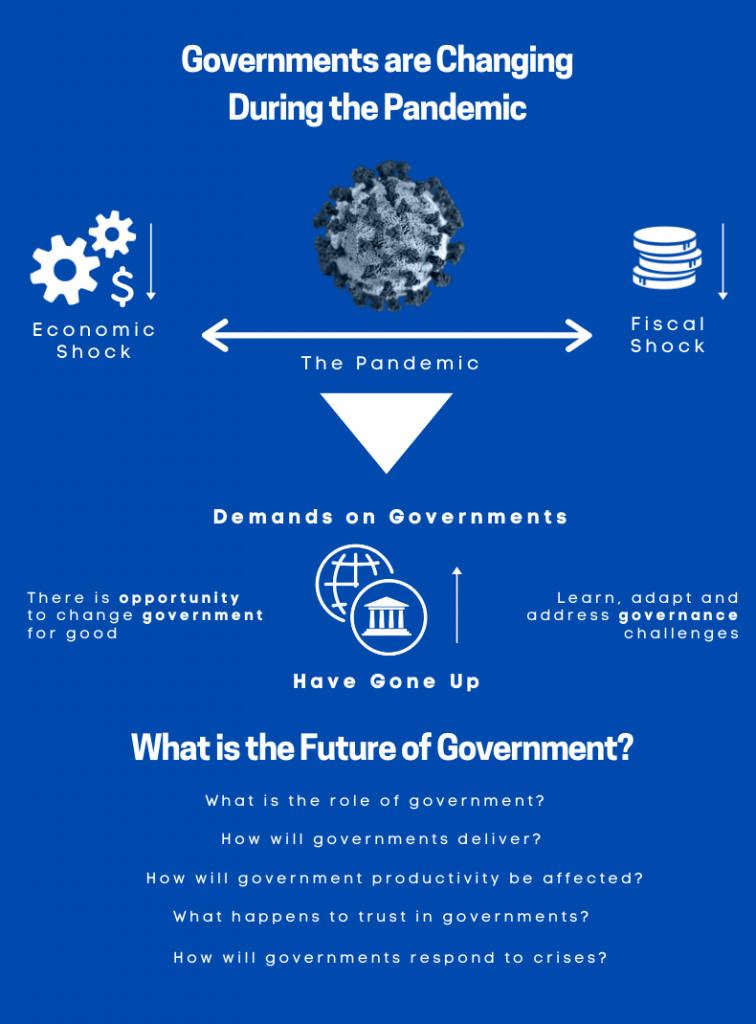 What is the future of governments post COVID-19?
What is the future of governments post COVID-19?
Governments are at the heart of the response to COVID-19. The pandemic’s nature necessitates action on multiple fronts, not just public health measures to prevent the spread of the virus but also efforts to cushion the economic effects on households and firms. However, restrictions on movement and economic activity are constraining governments’ ability to respond.
Change is inevitable, given the multiple shocks governments are facing:
- Health shock. Public health measures must be put in place to keep people apart, slow the spread of the disease, and treat those who are infected.
- Economic shock. Shutdowns have had an adverse effect on people’s livelihoods, prompting governments to expand existing social protection programs or create new ones. To revive the economy, pragmatic measures must be taken to keep businesses afloat and avoid collapse.
- Fiscal shock. Revenues have fallen due to the shutdowns. The crisis has led to an immediate reorientation of expenditure priorities and increases in borrowing. There will be measures to generate fiscal savings and improve efficiency to help address the resulting medium and long-term fiscal challenges.
These shocks are affecting governments in unprecedented ways. The pandemic is changing social values and norms as well as the way the economy functions. This will have an impact on both the role of government and how it works going forward.
Prior to the pandemic, some governments already faced multiple challenges in managing their economies and delivering services. The crisis has exposed vulnerabilities such as coordination failures, weak public institutions, ineffective and inefficient use of limited resources, insufficient accountability, and issues of patronage and corruption.
In the short term, the pandemic has also illustrated, in several countries, that it is possible for governments with capable institutions to act decisively. By contrast, countries with weak health systems and no social safety nets have found it challenging to respond. Though the challenge has forced governments to look inward first – closing borders and focusing on their own populations – the recovery will require collective action by governments and international actors on a global scale.
Governments that continuously learn, adapt, and actively build coalitions are best placed to have a successful response. The pandemic creates huge uncertainty about the future: no one knows how norms, values and demands on governments will fundamentally change, or to what extent. And during any crisis, governments inevitably make some mistakes. What is important is for them to understand what they know and don’t know, and to be willing to learn from their mistakes and successes and those of others.
The pandemic could change governments for the worse. They might choose to consolidate power, undermine respect for human rights and the rule of law, and adopt increasingly isolationist policies with the pandemic as justification.
But these scenarios can and must be avoided, and governments must seize the opportunity to change for the better. We must start a conversation today about what the future of governments should look like after COVID-19. We need to ask five important questions :
- How will the role of government change? How might delivery of core services and management of the economy change? Will the private sector’s degree of direct involvement in and ownership of enterprise increase, and, if so, how?
- How will governments deliver? How might institutions function differently? Services may be delivered remotely. Students may learn at home, and schools may become the place where learners meet teachers to solve problems. Will public sector institutions also rely more heavily on a workforce that operates remotely?
- How will governments be more productive? How will they improve efficiency in response to the fiscal shock? Changes in the way government delivers services may improve productivity. How might resources be reprioritized, and how might the terms of public service employment and private sector engagement change? How can the use of technology and data improve productivity?
- How will citizens’ trust in government be affected? How might using communication, along with interventions at the national, local and community levels, build trust and promote collective action?
- How will governments prepare for future crises? Given citizens’ demands and the current response to COVID-19, how will governments prepare for a future contagion? How will responsiveness to various types of crisis, including climate change, be different?
When thinking about the future of government, we also need to consider key issues such as:
- What is the pandemic changing, what is staying the same, and what do we not know? Understanding and answering these questions will help us prepare for the future.
- How will governments change? The process and approach that governments choose to take will be crucial to delivering a positive change.
In the context of multiple challenges and uncertainty, short-term action must focus on present needs with an eye to the future. The opportunity to build more effective, accountable, and resilient governments will guide policy responses that will have lasting impact for generations to come. We welcome a debate on how the COVID-19 pandemic can push governments to be better.

Blogs in the Future of Government series:
- Introducing the Future of Government Initiative’s Debate Series, by Ed Olowo-Okere | May 11, 2021
- Understanding what people want from their leaders: the first Future of Government Disruptive Debate, event recap by Donna Andrews, Tim Williamson, & Jacques Rosenberg | May 29, 2021
- What the demands on and future objectives of government mean to me, by President Laura Chinchilla Miranda | May 29, 2021
- How will the role of government change after the pandemic? event recap by Donna Andrews, Tim Williamson, & Marje Aksli | June 25, 2021
- The future of government: a new social contract for the 21st Century? By Kumi Naidoo | July 20, 2021
- How officials can do better at delivering services to citizens, event recap by Alasdair Fraser, Donna Andrews, & Tim Williamson | November 3, 2021
- How to increase government productivity in the post-COVID-19 world, event recap by Jacques Rosenberg, Donna Andrews, & Tim Williamson | November 4, 2021
- Trust— necessary fuel for effective governance, event recap by Donna Andrews, Tim Williamson, Marje Aksli, & Samuel Garoni | January 11, 2022
- The Future of Government: Basic Education and the (limited) role of technology in complex human endeavor by Lant Pritchett | June 23, 2022


Join the Conversation